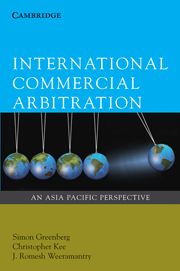Book contents
- Frontmatter
- Contents
- Foreword
- Preface
- Table of Cases
- Table of Statutes
- 1 Introduction to international arbitration and its place in the Asia-Pacific
- 2 Law governing the arbitration and role of the seat
- 3 Applicable substantive law
- 4 Arbitration agreement
- 5 Arbitral jurisdiction
- 6 The arbitral tribunal
- 7 Procedure and evidence
- 8 The award
- 9 The award
- 10 Investment treaty arbitration
- Appendix 1 Asia-Pacific arbitral institutions at a glance
- Appendix 2 Selected arbitral institutions
- Appendix 3 List of UNCITRAL Model Law countries
- Appendix 4 List of parties to the New York Convention 1958
- Appendix 5 Selected list of Asia-Pacific arbitration legislation and instruments
- Glossary
- Index
5 - Arbitral jurisdiction
Published online by Cambridge University Press: 05 June 2012
- Frontmatter
- Contents
- Foreword
- Preface
- Table of Cases
- Table of Statutes
- 1 Introduction to international arbitration and its place in the Asia-Pacific
- 2 Law governing the arbitration and role of the seat
- 3 Applicable substantive law
- 4 Arbitration agreement
- 5 Arbitral jurisdiction
- 6 The arbitral tribunal
- 7 Procedure and evidence
- 8 The award
- 9 The award
- 10 Investment treaty arbitration
- Appendix 1 Asia-Pacific arbitral institutions at a glance
- Appendix 2 Selected arbitral institutions
- Appendix 3 List of UNCITRAL Model Law countries
- Appendix 4 List of parties to the New York Convention 1958
- Appendix 5 Selected list of Asia-Pacific arbitration legislation and instruments
- Glossary
- Index
Summary
Introduction
The features and requirements of arbitration agreements were examined in Chapter 4. This chapter addresses procedural and other issues that can arise when a party wishes to contest an arbitral tribunal's jurisdiction. It also considers the link between an arbitral tribunal's authority to rule on its own jurisdiction and the control of that authority by domestic courts.
An arbitral tribunal's jurisdiction is far from automatic. It derives from the disputing parties' free will, i.e. their agreement to arbitrate. The consensual nature of arbitral jurisdiction must be contrasted with the jurisdiction of domestic courts, which is established by the domestic law of the forum and any applicable treaties dealing with international judicial competence.
The consensual basis of arbitration means that a respondent party can attempt to contest or deny arbitral jurisdiction. The objecting party might never have agreed to arbitrate or, even if it previously agreed, may now prefer to litigate the dispute in a domestic court. In the latter case the objecting party may seek to escape its obligation to arbitrate by denying its previous agreement. Alternatively, that party might raise jurisdictional objections in an attempt to delay and frustrate the resolution of the dispute.
After introducing and summarising the procedure of jurisdictional objections (Section 2), we examine preliminary issues concerning arbitral jurisdiction (Section 3), before dealing with the competence-competence rule and prima facie jurisdictional decisions by courts (Section 4), prima facie jurisdictional decisions by arbitral institutions (Section 5), and finally the effects of a court, institution or arbitral tribunal's jurisdictional decision (Section 6).
- Type
- Chapter
- Information
- International Commercial ArbitrationAn Asia-Pacific Perspective, pp. 202 - 244Publisher: Cambridge University PressPrint publication year: 2010



